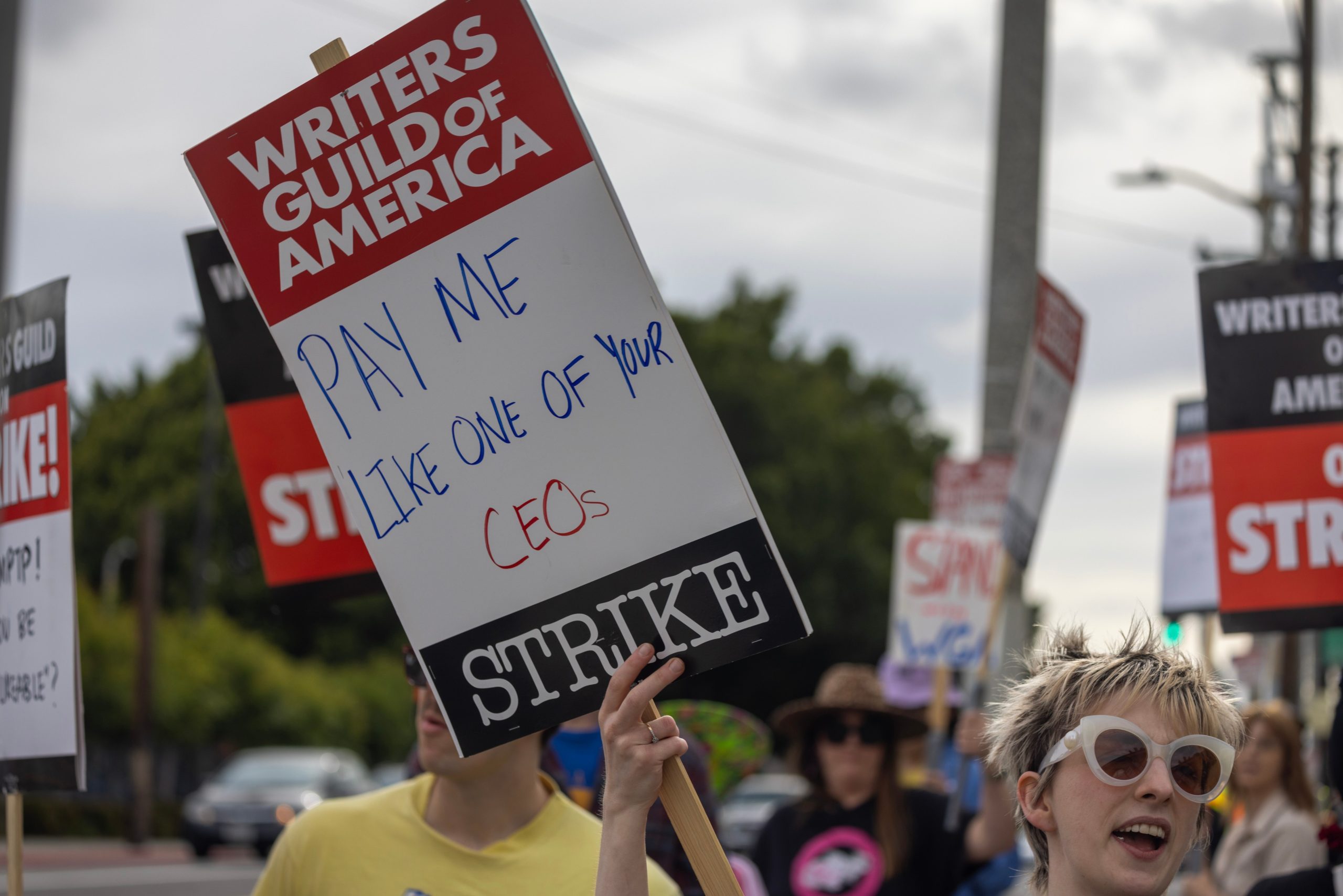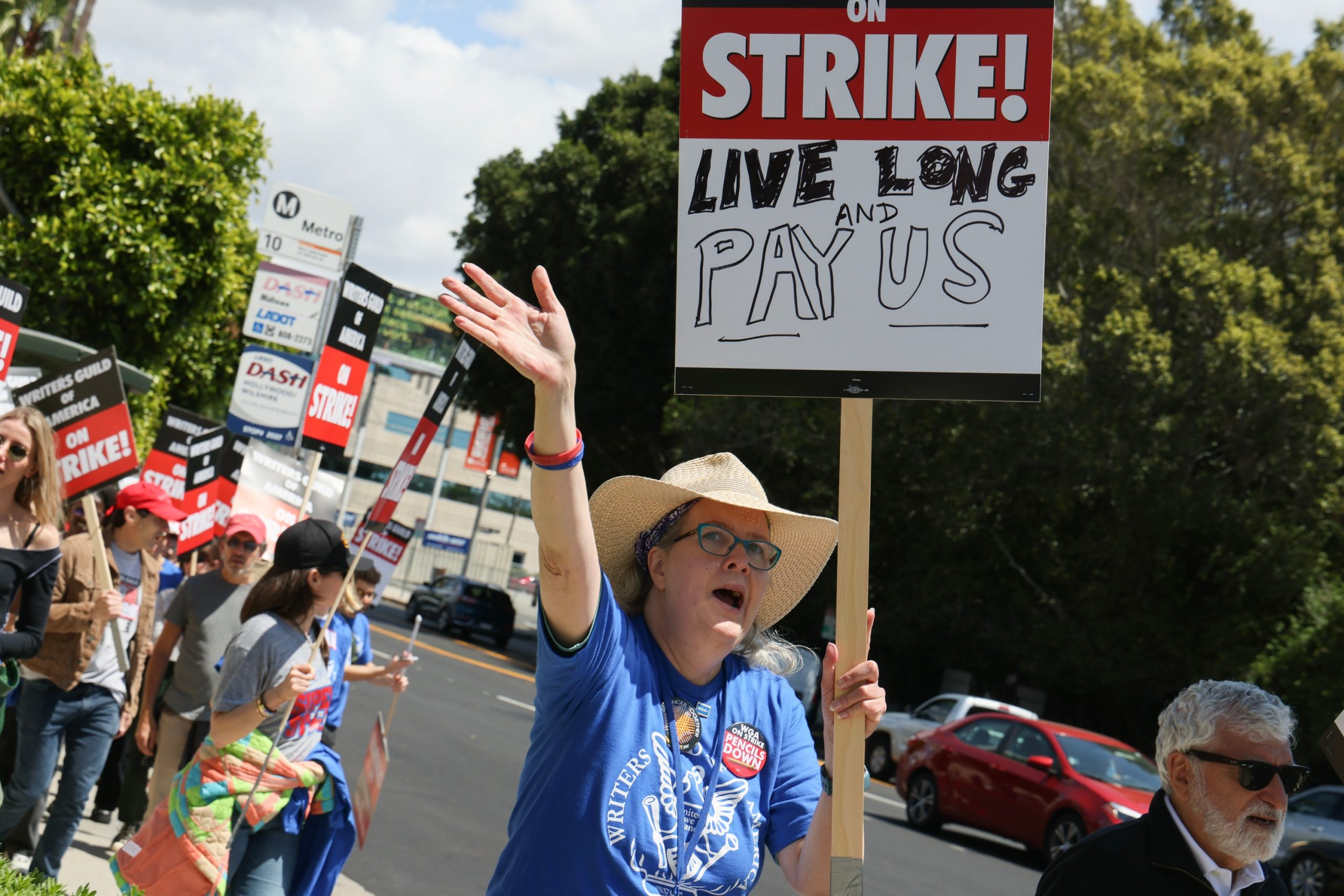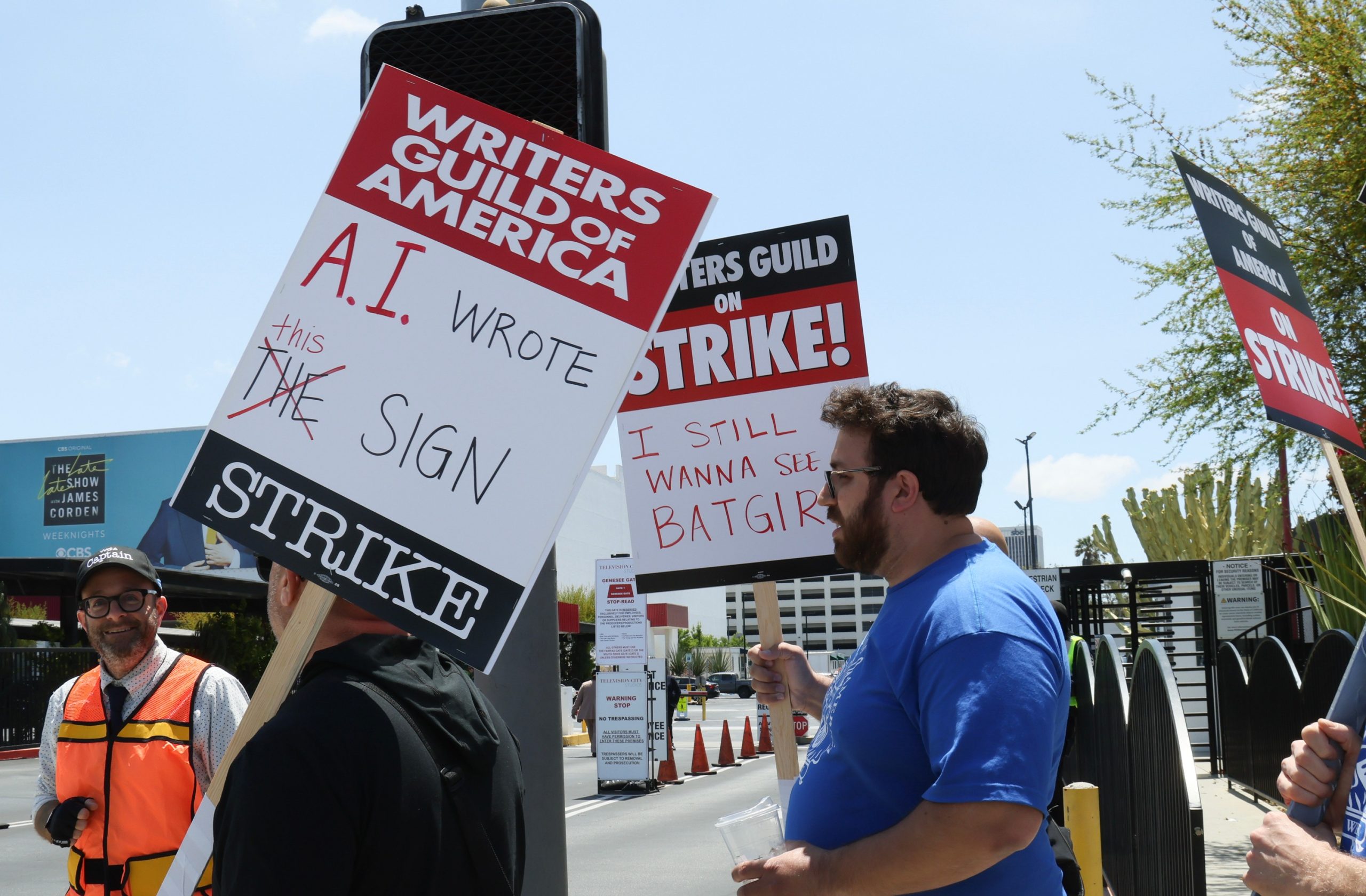
The WGA strike is currently underway in Hollywood. Rory Doherty argues that now is the time for solidarity as big corporations refuse to support their workers.
Things have gotten really bad for writers in Hollywood. More specifically, they’ve gotten worse in the past fifteen years, since the Writers Guild of America (WGA) last went on strike. A brief catch up: the 2007-08 strike is the reason that Michael Bay hates Transformers: Revenge of the Fallen and why Daniel Craig was one of the only people authorised to rewrite Quantum of Solace. It was triggered by studios and networks refusing to grant residuals for “new media”, including DVD sales and the flashy world of internet streaming.
In Hollywood, residuals are kind of life-saving: they’re cheques sent out to those who worked on media that’s aired repeatedly; those who acted in or worked behind-the-scenes on Friends or The Office US, for example, made a killing thanks to the near-constant reruns the shows saw on television.
Residuals first had to be negotiated by Hollywood’s unions (led, weirdly enough, by future union buster Ronald Reagan) because studios and networks wanted to keep all the additional income their products saw for themselves. This is important to note going forward: Hollywood resents the fact that all the labour it profits from is done by human beings who, regrettably, are owed fair treatment and compensation.
Streaming Wars
Since the strike in ‘08, you might have noticed that streaming has taken a more central role in entertainment culture. During the past decade’s cosmic expansion of how we access and consume media, the writers of celebrated and diverse hit shows have somehow been penalised – not receiving enough, if any, residuals from their work.

Members of the Writers Guild of America (WGA) and its supporters picket outside of Paramount Pictures on May 02, 2023 in Los Angeles, California. Hollywood writers have gone on strike in a dispute over payments for streaming services. (Photo by Rodin Eckenroth/Getty Images)
This has only gotten worse in a post-pandemic market that has proved that going all-in on streaming isn’t a good idea, leading to more tightening of purses that ripples all the way down.
What’s more, streaming services are keeping their viewership numbers hidden, so they can hide their failures and prevent those who worked on their hit shows from knowing just how valuable their work was to their bosses.
In summary, streamers have been acting like the tech conglomerates they are and, in building their empires, have cut all corners possible. If they had their way, writing would go the way of taxis and couriers: a gig culture.
Is AI the biggest evil here?
Writers rooms, which have largely taken place over Zoom for the past three years, are being replaced with “mini-rooms”, which are built with fewer writers, less money, and less stability. They may be cheaper, but they are resulting in a starvation of early and established careers. There are fewer writers employed to appear on set, learning from showrunners and being available to rewrite scenes during production.

Members of the Writers Guild of America (WGA) and its supporters picket outside of CBS Television City on May 02, 2023 in Los Angeles, California. Hollywood writers have gone on strike in a dispute over payments for streaming services. (Photo by Rodin Eckenroth/Getty Images)
Incidentally, for all the assurance that House of the Dragon S2 will not be affected by strike action because their scripts are already written, not being able to rewrite on set will definitely impact its quality.
Writers have been financially and creatively alienated from their own work, without seeing any of the rewards of runaway hits: one writer won an award for their work on last year’s The Bear with a negative bank account balance and a bow tie bought on credit.
There’s also that nagging AI issue. Verified Twitter users were quick to claim that this strike will be trounced by artificial intelligence conjuring up near-flawless screenplays that don’t need human oversight – while writers are striking over the use of the technology to create original work.
The truth of how much AI will revolutionise filmmaking will likely be disappointing: people with lots of money, remember, like pretending flashy gimmicks are the future of the industry, despite having none of the foresight to recognise their lack of appeal or innovation. (Where are all our 4D, high-frame rate movies?!)
I stand with @WGAWest and @WGAEast and fully support them in their strike.
“If it ain’t on the page, it ain’t on the stage.”#WGAStrong
— Mark Hamill (@MarkHamill) May 2, 2023
Although it’s tempting to explain how unfeasible AI’s Hollywood dominance is to every blue-ticked goon (or every A-list director with limited talent), trying to make seasoned professional actors read lines generated by a computer might trigger a backlash big enough to end the strike in the writers’ favour immediately.
It’s not just about writers
Actors, of course, are affected in the WGA strike action too – the Screen Actors Guild and Directors Guild of America have advised their members to carry on working in writers’ absence, although no-one can be forced to work if they choose to honour the strike. Steve Carell famously breached his The Office contract by refusing to turn up to a set that had no writers present; as the hit star of an incredibly popular sitcom, he understood he had the most leverage to protect writers. If he didn’t want to work, no work would take place.
But writers are not the only ones facing mistreatment from higher-ups. It’s possible the next few months see a huge wave of union action that puts most of Hollywood on the picket line. Actors are seeing the same lack of residuals from streaming shows, and increasingly smaller paydays – even Euphoria breakout star Sydney Sweeney has complained before about needing constant work otherwise she would be broke. It’s made even more relevant when you consider recent “nepo baby” discourses: most actors simply cannot coast on industry connections and inherited wealth when the going gets tough.
But it doesn’t just affect those who appear on streaming: now network shows, traditionally thought the safer, more protected and profitable option for working actors and writers, are seeing main casts being demoted to “recurring” status – which means less money, regardless of how central to the show they are. “This is the beginning of the end for working class actors,” actress Ever Carradine wrote on Twitter. “I have never worked harder in my career to make less money, and I am not alone.”
On the day that his OPPENHEIMER trailer dropped, Christopher Nolan joined the picket line at Paramount with his brother Jonathan. Absolute boss. #wgastrong pic.twitter.com/PaPNuygSgs
— Beyond Fest (@BeyondFest) May 9, 2023
It doesn’t stop with writers and actors: everyone from directors to “below-the-line” crews are on the verge of industrial action, and there’s still rampant exploitation of non-unionized visual effects artists to deal with. Hopefully there will be a huge rise in visible, meaningful solidarity between all affected workers in Hollywood, but the responsibility to support industrial action doesn’t just extend to those working in entertainment, but those watching it too.
Solidarity is the only option
No, this doesn’t mean boycotting watching the TV shows affected by strikes, that’s not what the guilds are asking for. It does mean that you owe writers complete, vocal support for all strikes; it doesn’t matter how much you love HBO, Disney, or Netflix’s content, these corporations have never – not once – been on the side of Hollywood’s workers.
These CEOs and executives are not seeing the pay cuts their talent are suffering from, and as an audience, you have to recognise that solidarity against labour abuse is a million times more important than new TV getting to you on time.
At the end of the day, film and television isn’t important when compared to worker exploitation – as consumers, we have the least involvement and expertise to comment on the conditions under which media should be made.
Consuming the fruit of Hollywood’s labour comes with the expectation that you’re invested in it being made ethically; you’re only allowed to love film and television if it’s made under fair conditions. This rule has no exceptions, it allows no room for debate. The only permissible hot take on strikes is unconditional solidarity.
As the saying goes: LIGHTS, CAMERA… INDUSTRIAL ACTION!




